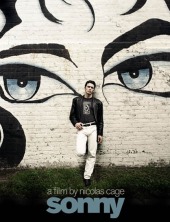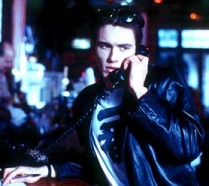|
Sonny
|
| |
 |
USA, 2002. Rated R. 110 minutes.
Cast:
James Franco, Mena Suvari, Brenda Blethyn, Harry Dean Stanton, Scott Caan,
Brenda Vaccaro, Seymour Cassel, Josie Davis, Nicolas Cage
Writers: John Carlen
Music: Clint Mansell
Cinematographer: Barry Markowitz
Producers: Nicolas Cage, Norm Golightly, Paul Brooks
Director: Nicolas Cage
LINKS
|
" ut
what I really want to do is direct."
ut
what I really want to do is direct."
The actor yearning to step behind the camera is one of the oldest
clichés in show business. Clint Eastwood, Kevin Costner, and Mel Gibson have
done it, and won Oscars. This year the cliché has been particularly apt, with
George Clooney (Confessions of a Dangerous Mind), Denzel Washington (Antwone
Fisher), Bill Paxton (Frailty),
and Ethan Hawke (Chelsea Walls) making their directorial debuts. Now
it's Nicolas Cage's turn, following in the footsteps of his uncle Francis Ford
Coppola, and his cousins Sofia and Roman Coppola (not to mention his cousin-in-law,
Spike Jonze).
For his directorial debut, Cage has chosen a script by written-for-television
specialist John Carlen—a script Cage had considered starring in fifteen
years ago. But now Cage is getting a bit long in the tooth to play the young
hustler Sonny, who specializes in older women. He recruited James Franco (City
By the Sea, Spider-Man) to play the role.
Sonny has just been discharged from the army, and returns home to New Orleans
to find a Norman Rockwell-like family tableau. His mother/pimp, Jewel (Brenda
Blethyn), now manages a young woman named Carol (Mena Suvari), who has no place
to sleep other than Sonny's bed, while Jewel's companion, father figure/alcoholic
armed robber Henry (Harry Dean Stanton), is still hanging around. Mom is elated
at Sonny's return, wanting Carol and Sonny to work "doubles" and things to be
just the way they once were.
Sonny has other ideas. His army buddy (Scott Caan) has promised him a legitimate
job down in Texas City, and Sonny can't wait to leave New Orleans behind. Predictably,
though, the old life has a way of sucking him back in, particularly when Carol
falls in love with him—though onscreen it looks more like she just decides
she's in love with him, a weakness in the script. The main conflicts thus take
shape—will Sonny and Carol be able to extract themselves from their seedy
existence, and will they find happiness, either alone or together?
The screenplay, which has been kicking around Hollywood for some fifteen years,
was originally set in the 1960s in Lafayette, Louisiana, by writer John Carlen,
but Cage insisted on shifting the setting to New Orleans and the time frame
to the early 1980s, in part because he was more familiar with the era. This
proves to be an excellent decision, as New Orleans is renowned for its sex industry
and carnal indulgences, and the Eighties setting means the story takes place
just before the AIDS scare brings the permissiveness of the 1970s to a grinding
halt.  This
unmentioned but looming event casts a melancholy over the film and raises the
stakes, because we know that if the protagonists don't escape their life, they
may be victims of something far worse than a lifetime of prostitution.
This
unmentioned but looming event casts a melancholy over the film and raises the
stakes, because we know that if the protagonists don't escape their life, they
may be victims of something far worse than a lifetime of prostitution.
Franco is an excellent choice for the walled-off but combustible hustler, but
he does not give the transcendent performance Sonny needs to overcome
gaps in character development and story logic. Franco's directions from Cage
seem to have consisted of doing the James Dean thing from Franco's lauded made-for-cable
biopic for the brooding moments, and imitating Nicolas Cage's out-there routine
for the fiery moments.
Speaking of Cage calling attention to himself, Cage himself appears briefly
as a buck-toothed pimp named Acid Yellow, whose name indicates his preference
in clothing. It is a mistake. This is a showy, screen-stealing cameo, the kind
that takes you out of the film because you're too busy thinking, "Hey, is that
Nic Cage? Omigod, it is!" to focus on a key juncture in Sonny's story,
an event rendered more problematic by Sonny's mixed-up decision-making. Perhaps
Cage wanted to distract the audience from asking how and why Sonny does what
he does. Again, more refined character development rather than reliance on Franco's
bipolar brooding/angry performance would have helped. Sonny doesn't have to
be a logical person, but the film needs to delineate his complex character better,
rather than assuming that the audience will simply get who he is because of
the hard life he's led. Fortunately, Sonny's rough charm and perfectly reasonable
desire to escape his life will be enough to gain most people's sympathy and
hold their attention, carrying the film. Sonny only seems to drag when
Sonny has a raging fit, mostly because Cage loves to milk a raging fit for more
than it's worth.
For all the shortcomings Cage may have as a director, he seems to be excellent
at providing a comfortable environment for his actors, who must perform naked
in several scenes. Actors who become directors often are, because they understand
the actor's point of view. The fine work of the supporting cast helps the film's
disparate elements interlock more smoothly. Harry Dean Stanton (Paris, Texas,
Alien) is effortless as usual, making a no-account
character seem almost tragic without breaking a sweat, while British-born Brenda
Blethyn (Lovely and Amazing, Secrets
and Lies) clearly must have gone to a great deal of effort to again play
an American—a Southerner—so flawlessly. Suvari, who has been excused
from the film's abundant nudity, is adequately convincing in a more substantive
role than she's been getting of late (The Musketeer,
American Pie 2), relying effectively on her large eyes. Those expressive
eyes help to disguise the fact that, when sex between two people is relatively
meaningless (as it must be for Sonny and Carol), the burden of the relationship
falls even more heavily on the emotional bond, which is not sufficiently present
in the script.
The ending is unusually open, which some will find dissatisfying and others
intriguing. Two choices are presented. Though Sonny visualizes one path, the
film seems to indicate that he chooses the other. It's as if both endings were
screen tested, and because Cage and Carlen couldn't decide which one was better,
they stuck them both in. Viewers will undoubtedly make their own choice, leaving
the theater with the ending they prefer, happiness or resigned desperation.
Two paths present themselves also to Cage, acting and directing. His star as
an actor has been slightly tarnished with a number of mediocre films like Gone
in Sixty Seconds and The Family Man,
but the success of Adaptation puts his career back on track. As a directorial
debut, Sonny shows promise, and if directing skill is genetic, we can
believe Cage may fulfill his promise with more time behind the camera and less
insistence that the lead actor do what Cage himself would do. Whichever path
Cage chooses, we should hope that he will turn his back now on projects like
Captain Corelli's Mandolin
and Con Air, because Sonny and Adaptation confirm that
Cage does his best work in the service of idiosyncratic material.
Review
© December 2002 by AboutFilm.Com and the author.
Images © 2002 Samuel Goldwyn Films. All Rights Reserved.

 This
unmentioned but looming event casts a melancholy over the film and raises the
stakes, because we know that if the protagonists don't escape their life, they
may be victims of something far worse than a lifetime of prostitution.
This
unmentioned but looming event casts a melancholy over the film and raises the
stakes, because we know that if the protagonists don't escape their life, they
may be victims of something far worse than a lifetime of prostitution.
